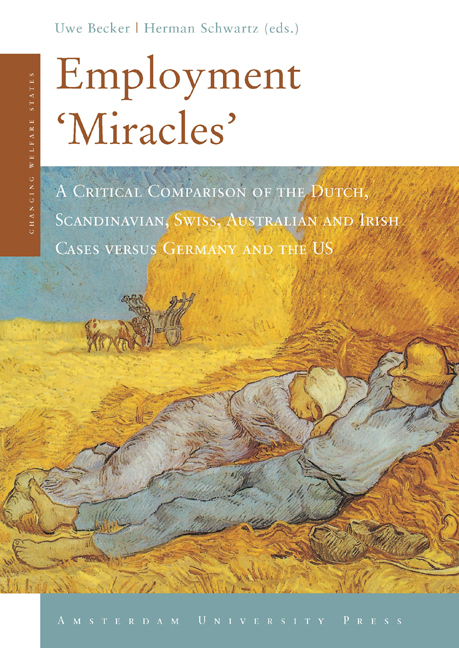 Employment 'Miracles'
Employment 'Miracles' Book contents
- Forntmatter
- Contents
- Preface
- 1 Introduction: Miracles, Mirages and Markets
- 2 The Dutch Model: Magic in a Flat Landscape?
- 3 Employment and Unemployment in Denmark and Sweden: Success or Failure for the Universal Welfare Model?
- 4 The Evolution of the Finnish Model in the 1990s: From Depression to High-Tech Boom
- 5 The Swiss Miracle: Low growth and high employment
- 6 Recasting the Story of Ireland’s Miracle: Policy, Politics or Profit?
- 7 The Australian Miracle: Luck, Pluck or Being Stuck Down Under?
- 8 Last Year’s Model? Reflections on the American Model of Employment Growth
- 9 The German Contrast. On Bad Comparisons, Special Circumstances, Luck and Policies That Turned Out to Be Wrong
- 10 Conclusion: The Importance of Lucky Circumstances, and Still the Liberal-Social Democratic Divide
- Bibliography
- Contributors
- Index
10 - Conclusion: The Importance of Lucky Circumstances, and Still the Liberal-Social Democratic Divide
Published online by Cambridge University Press: 15 January 2021
- Forntmatter
- Contents
- Preface
- 1 Introduction: Miracles, Mirages and Markets
- 2 The Dutch Model: Magic in a Flat Landscape?
- 3 Employment and Unemployment in Denmark and Sweden: Success or Failure for the Universal Welfare Model?
- 4 The Evolution of the Finnish Model in the 1990s: From Depression to High-Tech Boom
- 5 The Swiss Miracle: Low growth and high employment
- 6 Recasting the Story of Ireland’s Miracle: Policy, Politics or Profit?
- 7 The Australian Miracle: Luck, Pluck or Being Stuck Down Under?
- 8 Last Year’s Model? Reflections on the American Model of Employment Growth
- 9 The German Contrast. On Bad Comparisons, Special Circumstances, Luck and Policies That Turned Out to Be Wrong
- 10 Conclusion: The Importance of Lucky Circumstances, and Still the Liberal-Social Democratic Divide
- Bibliography
- Contributors
- Index
Summary
What are the main results of the previous chapters? Did the small countries discussed in this volume develop new ways of generating employment and particularly of dealing with the issue of work and welfare that is often supposed to be a dilemma? Are they ‘models’ other countries can learn from, did they establish a specific form of competitiveness? How important has been deliberate policy? What about luck? These questions have guided the contributions to this volume, and they will be addressed again in this final chapter. Furthermore, we briefly consider the latest developments and the prospects of the political economies of ‘our’ small countries. The chapter will end with some considerations on the fundamental politico-economic alternatives that currently exist.
In sum
In Table 10.1 the main results of the contributions to this volume are summarised by using very rough indicators. A plus means that a country scores higher than average, a minus means that the score is lower than average (the qualification ‘all’ indicates a score above the historical average). To keep it simple, we have refrained from using two or three plusses and minuses to indicate the stronger and strongest positive or negative score. One has to be aware, of course, of the, sometimes significant, differences between plus or minus cases. In Denmark and Switzerland, it is rather the maintenance of a high employment level than employment growth; in Ireland, GDP growth has been much higher than in the other countries; the same is true for house prices; in the USA the house price bubble occurred later than and not as intensively as in the European bubble countries and Australia; Dutch and us tax relief on mortgage interest is considerably more generous than the Danish and Australian one; and the number of part-time jobs, particularly tiny ones, has increased more in the Netherlands than in Australia and Ireland. For the purpose of a concluding comparison, the chosen indicators are sufficiently precise, however. For a detailed exposure of the differences between the countries, one has to turn to the statistical material presented in the Introduction and subsequent chapters.
- Type
- Chapter
- Information
- Employment 'Miracles'A Critical Comparison of the Dutch, Scandinavian, Swiss, Australian and Irish Cases versus Germany and the US, pp. 231 - 248Publisher: Amsterdam University PressPrint publication year: 2005


